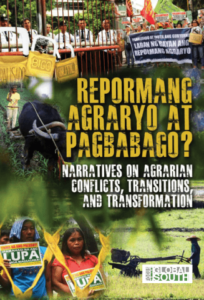17/09/2018
Under: Philippines, Publications, The Commons
Focus is pleased to release online its newest publication Repormang Agraryo at Pagbabago? Narratives on Agrarian Conflicts, Transitions, And Transformation; the launch of the book edition took place on September 11, 2018 in Quezon City, Philippines.
More than four decades of agrarian reform—from the time of Ferdinand Marcos to Benigno Aquino III—has been implemented in the Philippines. The AR program under the post-EDSA 1986 governments was envisioned to be a social justice program articulated in the 1987 Constitution, with land redistribution aimed at breaking the monopoly of the landed elite at its heart. Has the program succeeded or is it a failure?
Our new publication aims to assess the impact of Ferdinand Marcos’ Presidential Decree 27, and the Comprehensive Agrarian Reform Program (CARP) and CARP Extension with Reforms (CARPER) that came after it, by putting together the stories and lived experiences of the farmer-beneficiaries and their families. The stories they shared are presented in the form of case narratives which attempt to represent the different themes pertaining to agrarian reform, going beyond the specific locations featured. The case study on Leyte shows the impact of natural disaster on agrarian reform implementation while the case studies on Hacienda Luisita and Negros Occidental tackle the emerging trend of arriendo, where the beneficiaries lease their awarded lands to earn income in the absence of support service from government. Meanwhile the case of the beneficiaries in the banana plantations in Davao is a study of the agribusiness venture agreements (AVAs), another modality that CARP/ER gave birth to. The case study on Nueva Ecija traces back agrarian reform in the province to the Marcos era; and the Sumalo story raises the issue of historical occupancy.






